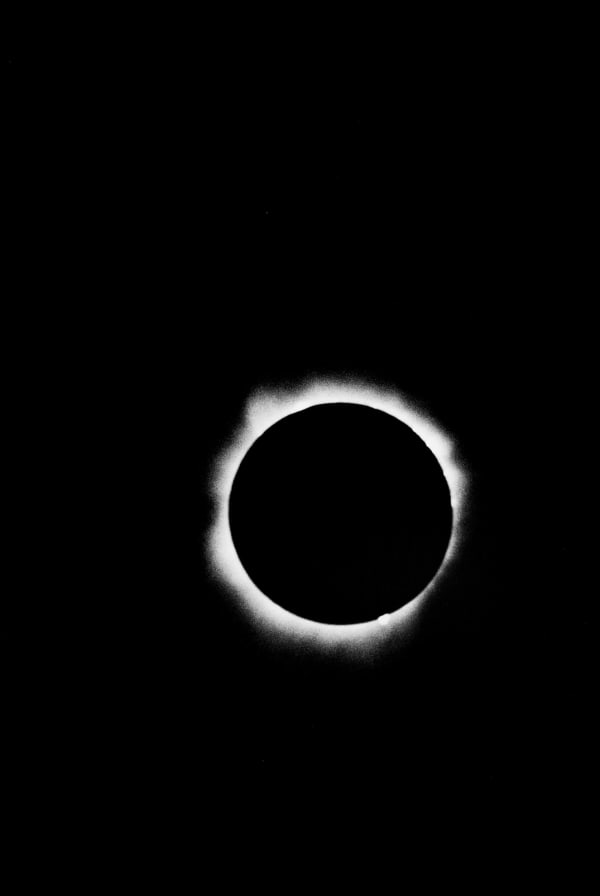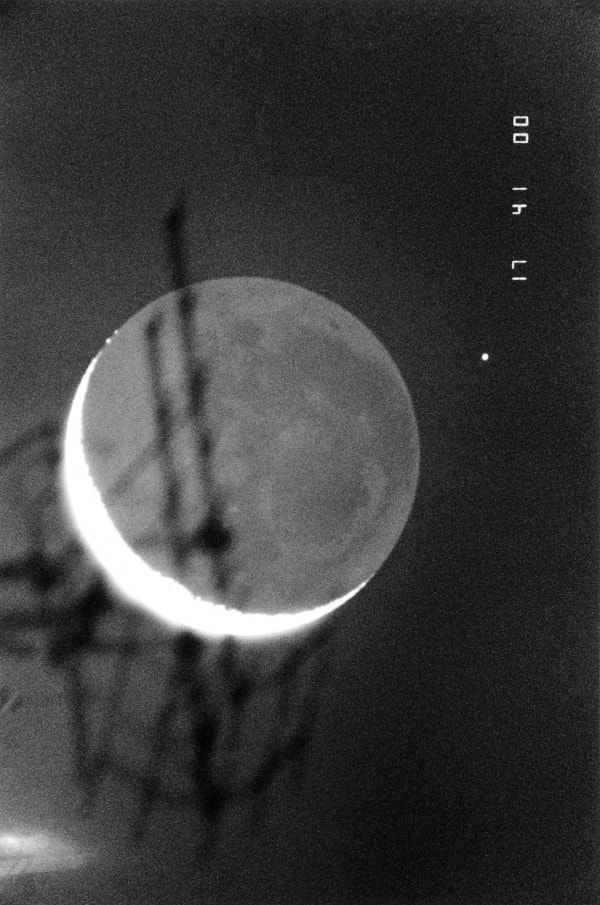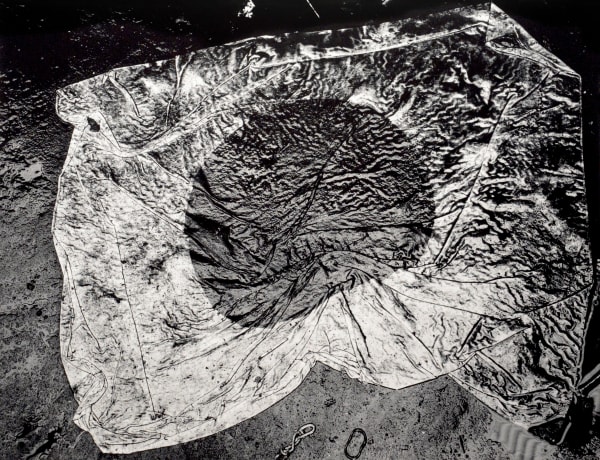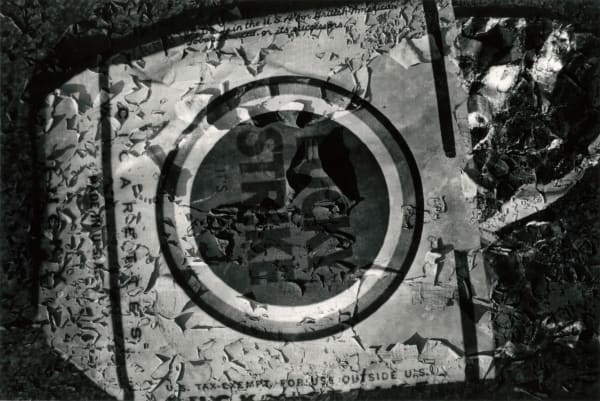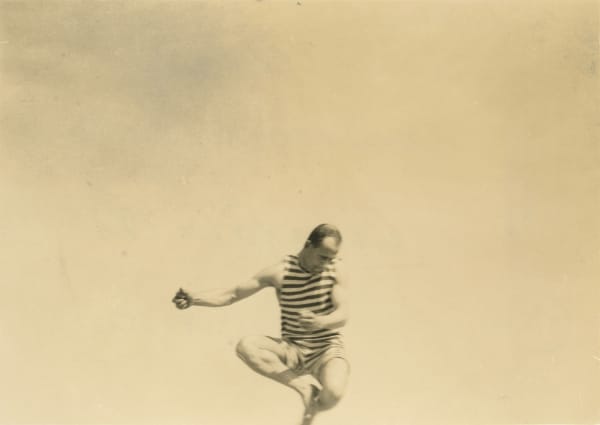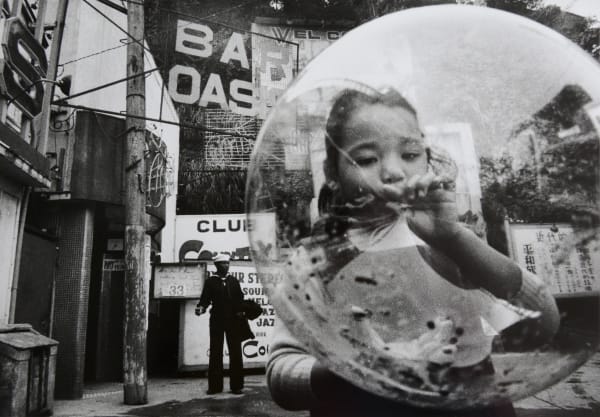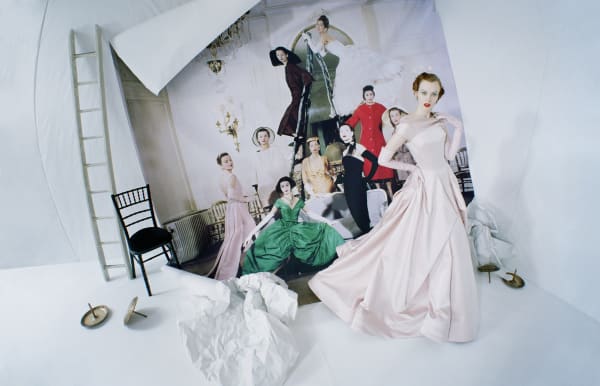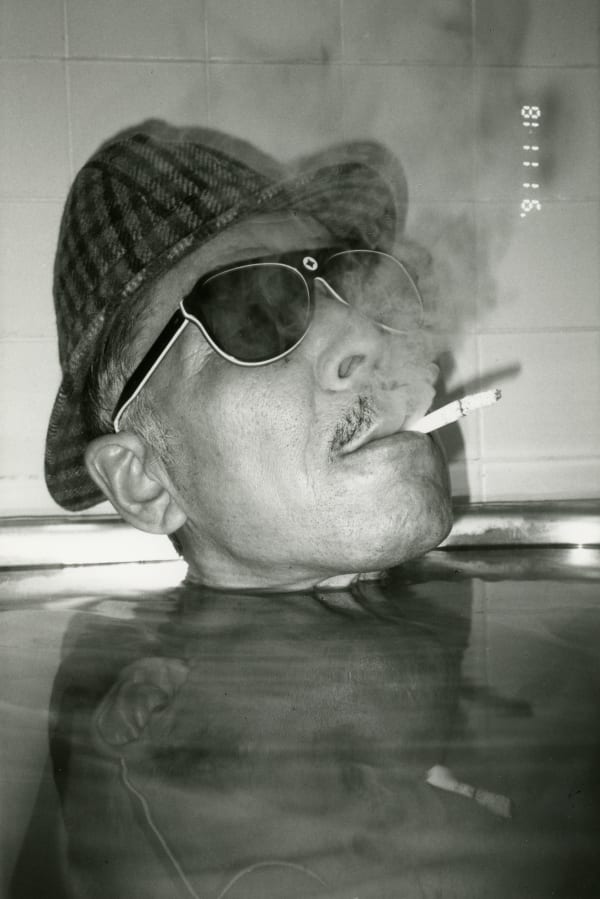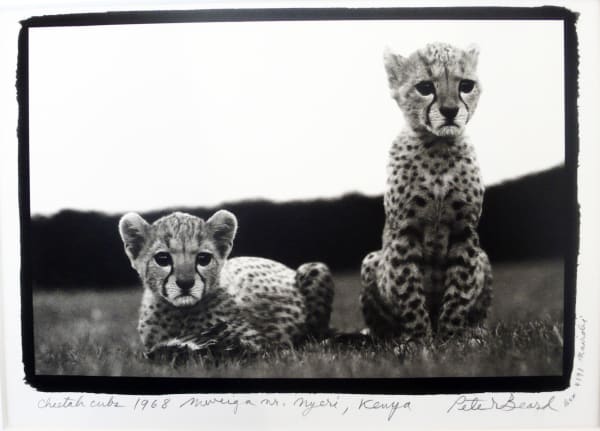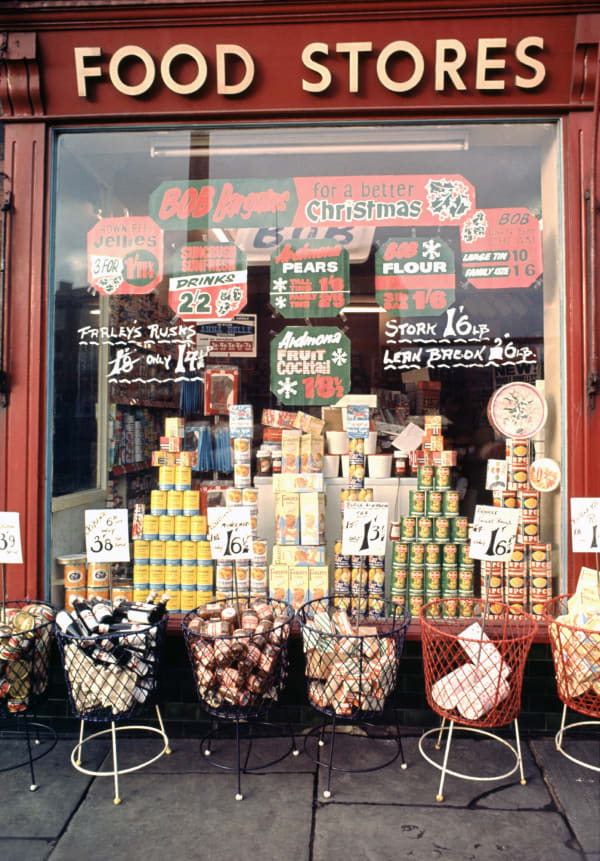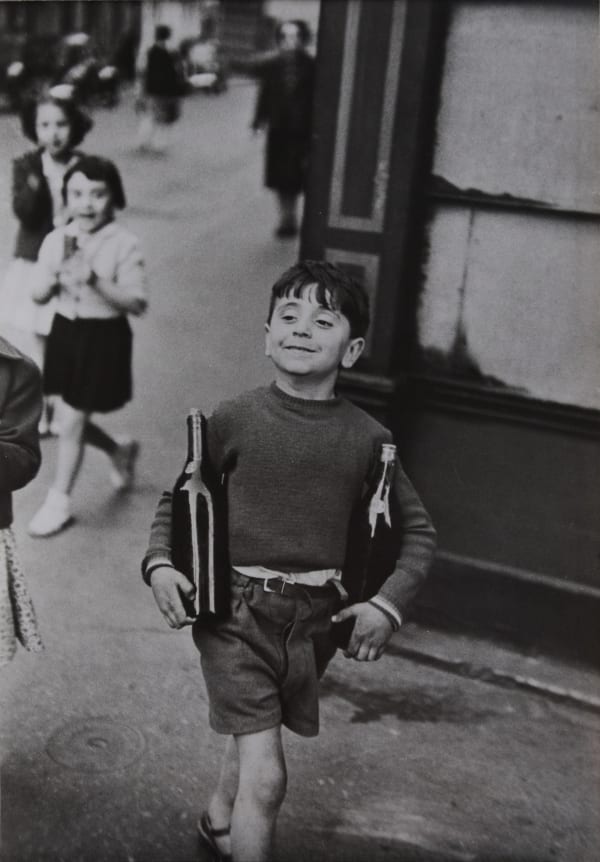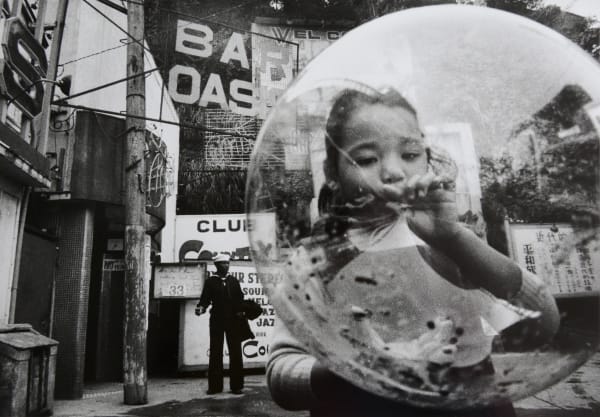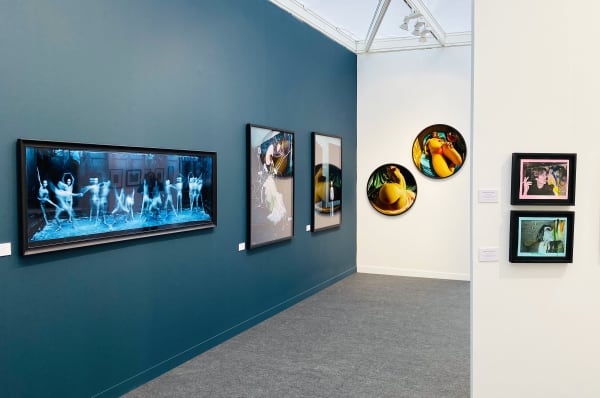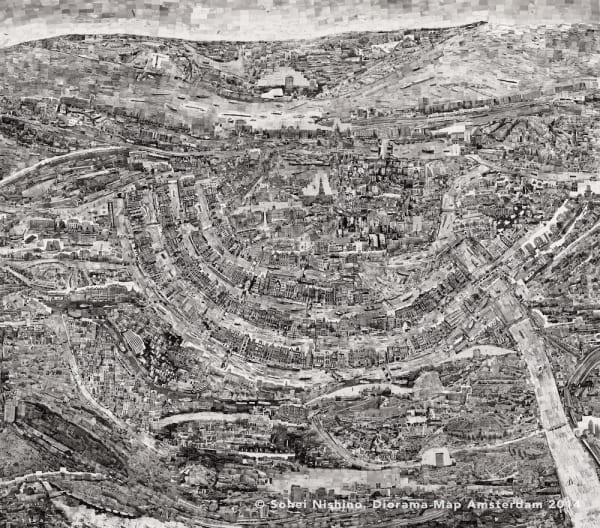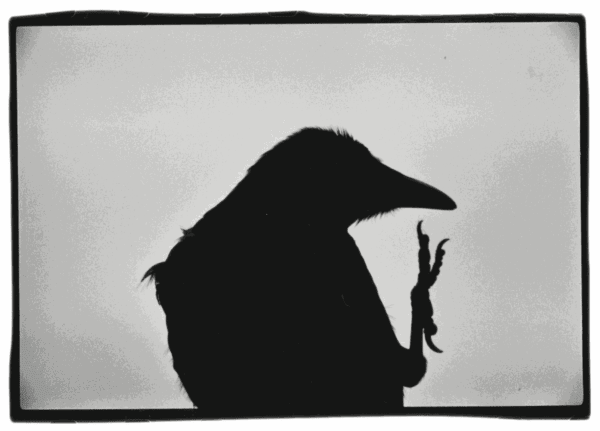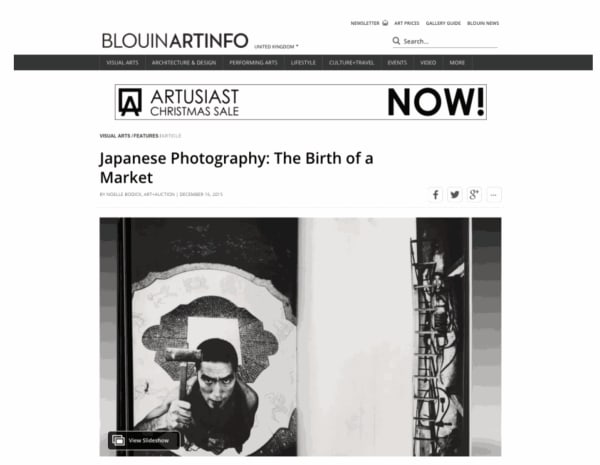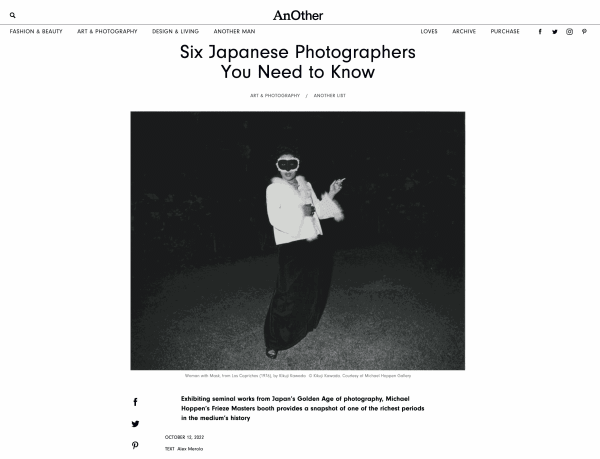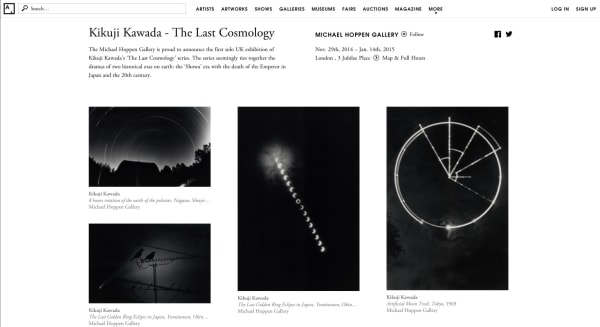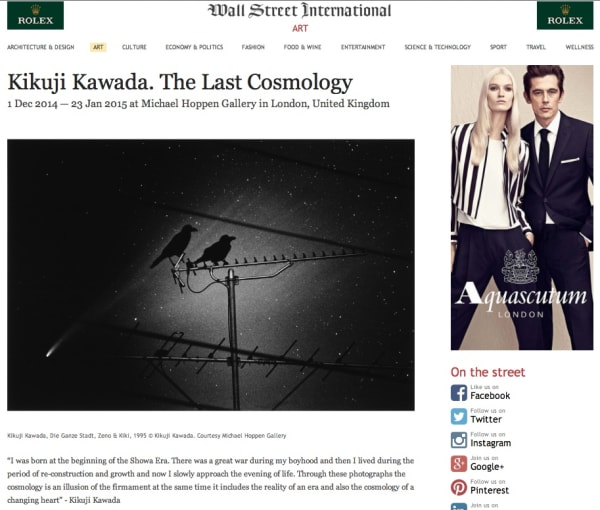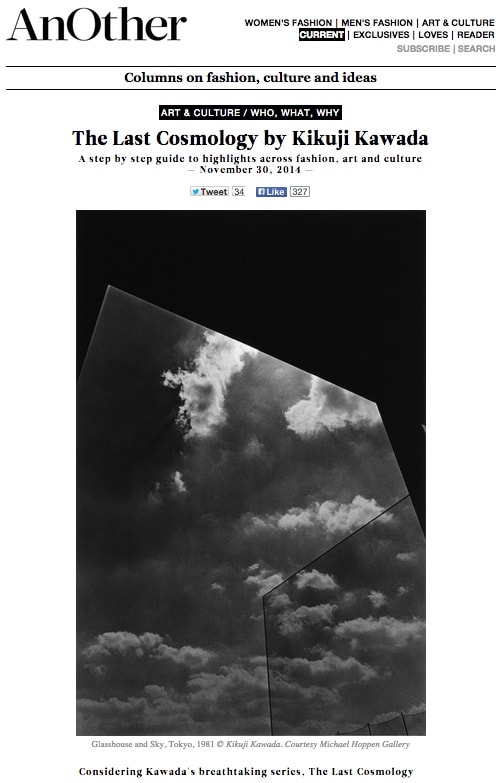-
 Matira Point, 1994
Matira Point, 1994 -
 A Partial Eclipse, 1987
A Partial Eclipse, 1987 -
 The Last Eclipse of the Sun in 20th century Japan, 11:23am, 18 March, 1988
The Last Eclipse of the Sun in 20th century Japan, 11:23am, 18 March, 1988 -
 The Sun and Clouds, Tokyo, 1988
The Sun and Clouds, Tokyo, 1988 -
 A crescent and TV aerial, Tokyo, 1988
A crescent and TV aerial, Tokyo, 1988 -
 Helio-Spot and a Helicopter, Tokyo, 1990
Helio-Spot and a Helicopter, Tokyo, 1990 -
 Hinomaru, The Japanese National Flag, 1962
Hinomaru, The Japanese National Flag, 1962 -
 Lucky Strike, from Chizu (The Map), 1960-65
Lucky Strike, from Chizu (The Map), 1960-65 -
 Woman of Sankt Pauli, from Sei Naru Sekai - Sacre Atavism, 25th June, 1969
Woman of Sankt Pauli, from Sei Naru Sekai - Sacre Atavism, 25th June, 1969 -
 Wedding Veil, Tokyo, Los Caprichos, 1986
Wedding Veil, Tokyo, Los Caprichos, 1986 -
 In Swimming Pool, Tokyo, Los Caprichos, 1978
In Swimming Pool, Tokyo, Los Caprichos, 1978
KIKUJI KAWADA
(Japanese, b.1933)
CHRONOLOGY
1933 Born in Ibaraki Prefecture, Japan
1955 Degree in Economics from Rikkyo University in Ikebukuro, Tokyo
1955-59 Staff photographer for Shincho Sha Publishing Company
1959 Co-founds VIVO, a photographers' cooperative, with Ikko Narahara, Shomei Tomatsu, Eikoh Hosoe, Akira Sato and Akira Tanno
First solo exhibition, The Sea, at Fuji Photo Salon, Tokyo
1961 Solo exhibition of The Map at Fuji Photo Salon, Tokyo
1962 VIVO disbands
1965 The Map, designed by Sugiura Kohei, is published by Bijutsu Shuppan-sha
1967-69 Teaches photography at Tama Art University, Tokyo
1974 One of the 15 artists in the New Japanese Photography exhibition at the Museum of Modern Art, New York
1978 VIVO: Contemporary Photography, Santa Barbara Museum of Art, CA
1979 Cosmos of the Dream King, Ludwig II, published by Asahi Sonorama
Japan: A Self-Portrait, International Center of Photography, New York
1984 Publishes Nude and Ludwig II
1986 Caprichos self-published
Japon des Avant-Gardes 1910-1970, Centre Georges Pompidou, Paris
1995 The Last Cosmology is published
1998 The Globe Theater is published
2009 The Last Cosmology, The National Museum of Modern Art, Tokyo
2011 Receives lifetime achievement award from the Photographic Society of Japan
2022 MFA Boston acquires Chizu/The Map full collection and archive
SELECTED SOLO EXHIBITIONS
2013 UNKNOWN 2013
Leica Gallery, Tokyo, Japan
2010 World's End 2008-2010
P.G.I., Tokyo, Japan
2009 The Last Cosmology
The National Museum of Modern Art, Tokyo, Japan
2008 Remote Past: Memoir 1951-1966
P.G.I., Tokyo, Japan
2005 Kikuji Kawada: Eureka/ Multigraph
Shadai Gallery, Tokyo Polytechnic University, Japan
2004 The Map, 1960-1965
P.G.I., Tokyo, Japan
2003 Kikuji Kawada: Theatrum Mundi
Tokyo Metropolitan Museum of Photography, Tokyo, Japan
1999 The Globe Theater
Internationale Fototage Herten, Herten, NL
1998 Car Maniac
P.G.I. Shibaura, Japan
1996 ZENO - The Last Cosmology
P.G.I. Shibaura, Japan
The Last Cosmology
Higashikawa International Photography Festival, Higashikawa, Japan
The Last Cosmology
Mitsubishi-Jisho Artium, Fukuoka, Japan
1995 The Last Cosmology
Tower Gallery, Yokohama, Japan
1986 Los Caprichos 1970-80
P.G.I., Japan
1976 Kikuji Kawada Photographs
Shadai Gallery, Tokyo, Japan
1968 Sacré- Atavism
Nikon Salon, Ginza, Tokyo, Japan
1961 The Map
Fuji Photo Salon, Tokyo, Japan
1959 The Sea
Fuji Photo Salon, Tokyo, Japan
SELECTED GROUP EXHIBITIONS
2011 Forest and Art
Tokyo Metropolitan Art Museum, Tokyo, Japan
2005 The Shadow, Vestaellands Kunstmuseum, Denmark
2003 The History of Japanese Photography
Museum of Fine Arts, Houston, Texas, USA, traveling exhibition
Cleveland Museum of Art, Ohio, USA,
2001-02 Illusion
Kulturhuset, Stockholm, Sweden, traveling exhibition
Lunds Konstall, Sweden
Museet for Fotokunst, Denmark
Kulturhuset, Stockholm, Sweden, traveling exhibition
Brandt ski defabrik, Odense, Denmark
The Country Museum of Joenkoeping, Sweden
1999 Contemporary Photographic Art from Japan
Neuer Berliner Kunstverein, Berlin, Germany
Master Works, Master Photographers
Tokyo Metropolitan Museum of Photography, Tokyo, Japan
Exploring Photography: From the Museum CollectionNational Film Center
The National Museum of Modern Art, Tokyo, Japan
1998 Corridor of the Gaze / Theatrical Tableaux
Tokyo Metropolitan Museum of Photography, Tokyo, Japan
Realism in Postwar Japan 1945-1960
Nagoya City Art Museum, Japan
1995 Japanese Culture: The Fifty Postwar Years
Meguro Museum of Art, Tokyo, Japan
Objects, Faces and Anti-Narratives - Rethinking Modernism
Tokyo Metropolitan Museum of Photography,Tokyo, Japan
Works by 25 Photographers in Their 20's
Kiyosato Museum of Photographic Arts, Yamanashi, Japan
1991 Innovation in Japanese Photography in the 1960's
Tokyo Metropolitan Museum of Photography, Tokyo, Japan
Beyond Japan: A Photo Theatre
Barbican Art Gallery, London, UK
1988 Eight Japanese Photographers
P.G.I. Tokyo, Japan
1986 Japon des Avant-Gardes 1910-1970
Centre Georges Pompidou, Paris, France
1985 Paris, New York, Tokyo
Tsukuba Museum of Photography, Ibaraki, Japan
1979 Japan: A Self-Portrait
International Center of Photography, New York, USA
1978 VIVO: Contemporary Photography
Santa Barbara Museum of Art, Santa Barbara, CA, USA
1976-77 Neue Fotografie aus Japan
Kulturhaus der Stadt, Graz, Austria
1974 New Japanese Photography
Museum of Modern Art, New York, USA
1963 Contemporary Japanese Photographs
National Museum of Modern Art, Tokyo, Japan
1957 The Eyes of Ten
Konishiroku Photo Gallery, Ginza, Tokyo, Japan
AWARDS
2011 Lifetime Achievement Award, The Photographic Society of Japan
2004 The Minister of Education Award for Fine Arts
1996 The Photographic Society of Japan Annual Award
Domestic Artist Prize Higashikawa Award, Higashikawa International Photography Festival
COLLECTIONS
Museum of Fine Arts, Boston, Massachussetts, USA
Center for Creative Photography, University of Arizona, Tucson, USA
Centre Georges Pompidou, Paris, France
Kawasaki City Museum, Kawasaki, Japan
Kiyosato Museum of Photographic Arts, Yamanashi, Japan
Kushiro Art Museum, Kushiro, Japan
Musée National d'Art Moderne, Paris, France
Museum of Modern Art, New York, USA
National Museum of Modern Art, Tokyo, Japan
Nihon University, Tokyo, Japan
Tama Art University Museum, Tokyo, Japan
Princeton University Art Museum, Princeton, NJ, USA
The National Museum of Modern Art, Tokyo, Japan
Tokyo Polytechnic Institute, Tokyo, Japan
Tokyo Metropolitan Museum of Photography, Japan
Yamaguchi Prefectural Museum of Art, Yamaguchi, Japan
-

MIA Foto Fair
Milan, 20 - 23 March 19 - 23 Mar 2025Read more -

Photo London
Somerset House • Stand W02 10 - 14 May 2023Michael Hoppen is pleased to return to the 8th edition of Photo London with an exciting selection of works by iconic contemporary artists as well as newly-released works.Read more -

The Photography Show, AIPAD
Center 415 • Stand 225 30 Mar - 2 Apr 2023Upcoming photography fair in New York CityRead more -

Frieze Masters 2022
Regent's Park • Stand A08 12 - 16 Oct 2022At Frieze Masters 2022, we are delighted to be exhibiting key works by members of the iconic generation of Japanese photographers who rose to prominence during the post-war period. The...Read more -

Paris Photo 2021
Grand Palais Éphémère • Stand D24 10 - 14 Nov 2021We are absolutely delighted to be returning to Paris Photo 2021 after our forced absence from art fairs - but especially Paris Photo which we have participated in for the...Read more -

Paris Photo 2019
Grand Palais • STAND C9 7 - 10 Nov 2019Michael Hoppen Gallery will be showing a solo booth of Tim Walker at this years Paris PhotoRead more -

PARIS PHOTO 2017
Grand Palais • Booth C10 9 - 12 Nov 2017Michael Hoppen Gallery will be at Paris Photo, 2017, booth C10.Read more -

Paris Photo
GRAND PALAIS • BOOTH C10 12 - 15 Nov 2015The Michael Hoppen Gallery list of artists to be exhibited at Paris Photo 2015.Read more -

PAD London
BOOTH A18 14 - 18 Oct 2015Here is a brief synopsis of that the Michael Hoppen Gallery will be bringing to PAD Art Fair, London, this year.Read more -

Kikuji Kawada
The Last Cosmology 29 Nov 2014 - 31 Jan 2015Japan, showa era, cosmology, photography, space, night, sky, stars, moon, eclipse, monochrome, print,Read more
-

Summer Newsletter 2024
September 20, 2024I t has been another busy year for all of us at Michael Hoppen, and suddenly the summer is upon us! We are looking forward...Read more -

Photo London 2023
Michael Hoppen's Highlights May 10, 2023Michael Hopen Gallery is delighted to return to Somerset House for the 8th edition of Photo London. For this year's edition, we are proud to...Read more -

The Photography Show presented by AIPAD 2023
Michael Hoppen's Highlights March 21, 2023Michael Hoppen Gallery is pleased to return to AIPAD, New York, this year with an exceptional group of vintage prints. Each one has a story...Read more -

Frieze Masters 2022
Michael Hoppen's Highlights October 10, 2022Michael Hoppen Gallery is delighted to be exhibiting at Frieze Masters 2022, with key works by members of the iconic generation of Japanese photographers who...Read more -

Paris Photo 2021
Michael Hoppen's Highlights November 5, 2021Michael Hoppen Gallery is delighted to be returning to Paris Photo 2021 after our forced absence from art fairs – but especially Paris Photo which...Read more -

Winter Newsletter '19
Highlights and news from our artists and team in Paris and Japan November 7, 2019Our solo exhibition at the gallery in London, Tim Walker: Wonderful People , continues alongside the artist's major solo exhibition at the Victoria & Albert...Read more -

MASTERS OF JAPANESE PHOTOGRAPHY
Sainsbury Centre exhibition 11 Nov - 19 Mar, 2017Sainsbury centre in Norwich has opened a remarkable exhibition showcasing Japanese photography. Many of the works are available at Michael Hoppen Gallery.Read more -

Contemporary Japanese Photography Seminar
DAIWA Anglo-Japanese Foundation 11th May, 7:00 – 8:00pmMichael Hoppen and Simon Baker discuss the photographic creativity and innovation emerging from contemporary Japanese photo artists.Read more -

MHG Newsletter '16
Michael looks ahead to an exciting year for the gallery February 23, 2016The Michael Hoppen Gallery newsletter summarises the year ahead for the galleryRead more -

Japanese Photography: The Birth of a Market
Michael Hoppen talks to Blouin Art Info December 16, 2015Michael Hoppen talks to press about the Japanese photography and our long term partnership with many of the greatest post-war photographers.Read more -

Kikuji Kawada in conversation with Ryuichi Kaneko
Aperture Magazine May 28, 2015Legendary Japanese photographer talks to Aperture magazine.Read more -

Kikuji Kawada
The Last Cosmology March 21, 2015MACK unveils new edition of The Last Cosmology - Kikuji Kawada. Outstanding Japanese photographer.Read more -

Memories of Akira Sato
Mieko Wikstrom in conversation with Michael Hoppen February 2, 2015Akira Sato remembered by his long time muse Mieko Wikstrom. Japan, photography, sunset, sweden, New York, Vivo, photographyRead more
-

Six Japanese Photographers You Need to Know
Alessandro Merola, AnOther Mag, October 12, 2022 -

Dark night rising: the photographer who captured the mystery of the eclipse
Sean O'Hagan, The Guardian, March 19, 2015 -

First Solo UK Exhibition of Kikuji Kawada's 'The Last Cosmology' Series on View at Michael Hoppen Gallery
Art Daily Online, December 8, 2014 -

Kikuji Kawada - The Last Cosmology
Artsy, December 4, 2014 -

KIKUJI KAWADA: THE LAST COSMOLOGY
Paris Photo Agenda Online, December 1, 2014 -

Kikuji Kawada. The Last Cosmology
Wall Street International Art Online, December 1, 2014 -

The Last Cosmology by Kikuji Kawada
AnOther Magazine, November 30, 2014


